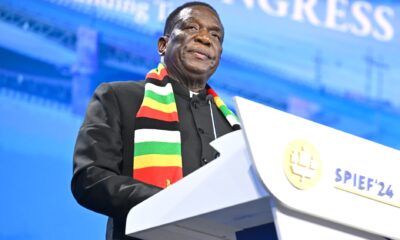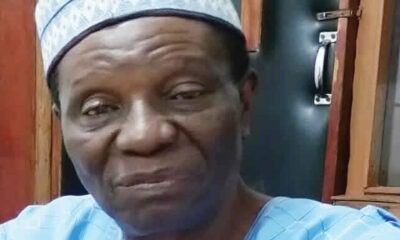Breaking News
JUST IN: CBN takes cash swap sensitization to traditional rulers, communities, markets in Ebonyi
Some market women and petty traders from the area, Ijeoma Okoronkwo, and Ijeoma Emmanuel, among others complained about the challenges facing them, which include, blocking of bank account numbers, difficulty to access bank officials for transactions due to crowds in their banks, high charges by POS agents for cash swapping, unavailability of bank accounts, among others.

The Central Bank of Nigeria, CBN, the weekend took its cash swapping and sensitization exercise on the new banknotes to traditional rulers, communities and markets across Ebonyi State.
The exercise took place at the Eke Okosi Okwu market in Ohaozara, Afo Eneagu Market in Onicha Local Government Areas, and other Ebonyi rural communities to ensure that market women and petty traders have access to the new Naira notes.
At the palace of Odenigbo I of Okposi Okwu Community in Ohaozara LGA of Ebonyi State, HRH Eze Onyibe Chukwu Agwu, the sensitization programme was extended to members of the community.
Speaking at the event, the CBN Deputy Director of Development Finance in Abuja, Chika Nwanja, said the cash swapping and sensitization programme were among the steps already taken by Nigeria’s apex bank to assist rural dwellers have full knowledge of the country’s policy on the newly designed Naira banknotes.
He said the CBN team had toured different communities across the 13 council areas of the State to sensitize the populace to be aware of the newly designed Naira notes and the deadline for the use of the old currencies, including N1,000, N500 and N200 naira notes.
Nwanja explained that “Today, we began at the palace of Odenigbo I of Okosi Okwu, Eze Onyibe Chukwu Agwu to sensitize his cabinet and other community members to be aware of the new Naira notes.
“We have emphasized the need for people, especially market women and petty traders to use financial multiple channels including banks, and Shared Agent Network Expansion Facilities(SANEF) to pay in their old currencies as well as get new ones, to avoid losses.
“This sensitization is necessary for some members of the public, who may have not got full knowledge of the newly designed currencies.”
Nwanja who was with Dr Elias Uduaja, the CBN Deputy Director on the Research Department in Abuja; Nnamdi Okeh, CBN Manager in Ebonyi State and Chioma Sebastian, CBN Senior Supervisor in Abuja and the financial agents of the Point Of Sale (POS) took the cash swapping and sensitization programme to the Eke Okosi Okwu market in Ohaozara, Afo Eneagu Market in Onicha LGA, and other Ebonyi rural communities to ensure the market women and petty traders have access to the new Naira notes.
The CBN team said, though they understood the challenges these redesigned currencies posed on the general public, especially the local people who have been complaining of one problem or the other, maintained that “the CBN is on top of it, and that’s why we are coming directly to the people at in their local communities.”
The team noted that the CBN has mapped out procedures to regulate the charges by its money agents on the customers at their POS units, saying that this necessitated the sensitization of the local populace to know how Nigeria’s apex bank operated.
Some of the stakeholders in the community, including the traditional ruler of the Okposi Okwu, Eze Onyibe Chukwu Agwu, his counterpart of the Okposi Kingdom, Eze Onyibe Cosmas Agwu, Elder Chief Ogbonnaya Ugwu, among others, described the introduction of the new Naira notes as a welcome development and urged the general public to follow the guidelines of the CBN.
They noted that the full use of the redesigned currencies would go a long way to reduce financial crimes, especially the demands of ransom by kidnappers and counterfeiting of the naira by criminals, based on the explanations from the CBN officials.
Some market women and petty traders from the area, Ijeoma Okoronkwo, and Ijeoma Emmanuel, among others complained about the challenges facing them, which include, blocking of bank account numbers, difficulty to access bank officials for transactions due to crowds in their banks, high charges by POS agents for cash swapping, unavailability of bank accounts, among others.










